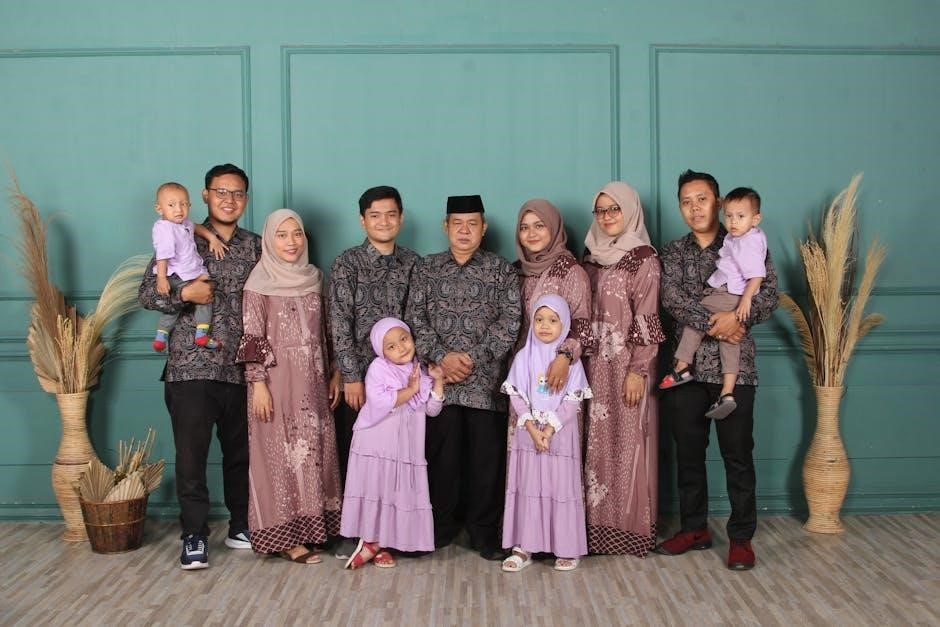Adults raised by emotionally immature parents often face unique challenges, as explored in Lindsay C. Gibson’s work. This book provides guidance for healing and understanding the lasting impact of such parenting styles;
Understanding the Impact of Emotionally Immature Parents
Emotionally immature parents often struggle to prioritize their child’s emotional needs, leaving lasting effects on their adult children. These parents may exhibit traits like emotional unavailability, lack of empathy, or self-involvement, which can hinder a child’s healthy development. As a result, adult children may experience difficulties in forming healthy relationships, managing emotions, and developing a strong sense of self. The impact can manifest as feelings of abandonment, low self-esteem, or a tendency to people-please. It’s important to recognize these patterns to begin the healing process. Lindsay C. Gibson’s work highlights how emotionally immature parenting shapes adult behaviors and provides insights into breaking these cycles. Understanding the root causes of these challenges is the first step toward recovery and personal growth.
The Importance of Healing for Adult Children
Healing is essential for adult children of emotionally immature parents to overcome the lasting effects of neglect, emotional unavailability, or self-involvement. Without addressing these wounds, patterns of emotional difficulties, relationship challenges, and self-esteem issues may persist. Healing allows individuals to break free from cycles of people-pleasing, fear of abandonment, and internalized shame. By acknowledging the impact of their upbringing, adult children can reclaim their emotional well-being and develop healthier ways of relating to others. Lindsay C. Gibson’s work emphasizes the transformative power of self-awareness, boundary-setting, and seeking support. Healing is not just about personal growth but also about creating a foundation for more fulfilling relationships and a brighter future. It’s a crucial step toward empowerment and reclaiming one’s identity, moving beyond the limitations imposed by emotionally immature parenting.

Characteristics of Emotionally Immature Parents
Emotionally immature parents often exhibit emotional unavailability, lack of empathy, and self-involvement. They may prioritize their own needs over their children’s, leaving adult children feeling unheard and invalidated.
Emotional Unavailability and Its Effects
Emotional unavailability in parents creates a profound sense of disconnection for their children. Growing up without consistent emotional support can lead to difficulties in trusting others and forming healthy relationships in adulthood. Adult children may struggle with feelings of abandonment and low self-worth, as their emotional needs were often overlooked. This unavailability can also impair their ability to regulate their own emotions, leading to heightened stress and anxiety. Over time, these individuals may develop people-pleasing behaviors or become overly self-reliant, fearing that others will similarly fail to meet their emotional needs. The lasting impact of emotional unavailability underscores the importance of addressing these wounds through self-reflection and professional guidance.
Lack of Empathy in Parenting Styles
Lack of empathy in parenting is a hallmark of emotionally immature parents, leaving adult children feeling unheard and invalidated. These parents often struggle to acknowledge their child’s emotions, dismissing their experiences rather than offering comfort or understanding. This emotional distance can lead to adult children grappling with self-doubt and difficulty in forming healthy relationships. They may internalize the belief that their feelings are unimportant or burdensome, fostering a pattern of people-pleasing or emotional suppression. Over time, this lack of empathy can hinder their ability to develop emotional intimacy and trust with others. The absence of empathetic parenting also impairs their capacity for self-compassion, making it challenging to navigate life’s challenges with resilience. Recognizing this dynamic is a crucial step toward healing and reclaiming emotional well-being.
Self-Involvement and Neglect of Children’s Needs

Emotionally immature parents often prioritize their own needs over their children’s, creating a dynamic where the child’s emotional and developmental requirements are consistently neglected. This self-involvement can manifest as a lack of interest in the child’s experiences, dismissive behavior, or even emotional unavailability. As a result, adult children may struggle with feelings of abandonment and low self-worth, questioning their own value and legitimacy. The parent’s focus on personal issues or desires leaves the child without the guidance and support necessary for healthy development. This neglect can lead to challenges in adulthood, such as difficulty in forming trusting relationships or establishing personal boundaries. Recognizing this pattern is essential for adult children to begin the process of healing and reclaiming their emotional well-being. It also underscores the importance of seeking external support to address these deeply rooted issues.

The Impact on Adult Children
Adult children of emotionally immature parents often experience emotional difficulties, relationship challenges, and self-esteem issues due to neglect and lack of support during their formative years.

Emotional Difficulties in Adulthood
Adults raised by emotionally immature parents often struggle with emotional regulation, leading to issues like anxiety, depression, and difficulty trusting others. These challenges stem from a childhood where emotional needs were consistently unmet, leaving individuals feeling unheard and invalid. As a result, they may develop internalized beliefs that they are unworthy or unimportant, which can manifest as self-doubt and low self-esteem. Additionally, they may struggle to form healthy boundaries, often people-pleasing to avoid conflict or abandonment. Lindsay Gibson’s work highlights how these patterns can disrupt personal growth and relationships, emphasizing the importance of recognizing and addressing these emotional wounds to achieve healing and emotional freedom. By understanding the root causes of these difficulties, adult children can begin to break free from the cycles of emotional pain and develop a more compassionate relationship with themselves.
Challenges in Forming Healthy Relationships
Adults raised by emotionally immature parents often face significant challenges in forming healthy relationships due to unresolved childhood emotional wounds. These individuals may struggle with trust issues, fearing abandonment or rejection, which can lead to overly dependent or avoidant attachment styles. They may also have difficulty setting and maintaining boundaries, often prioritizing others’ needs over their own to avoid conflict or gain approval. This people-pleasing behavior can result in feelings of resentment and burnout. Additionally, they may attract partners who are emotionally unavailable or immature, perpetuating the cycle of unfulfilling relationships. Lindsay Gibson’s work emphasizes that these patterns stem from a lack of emotional validation in childhood, making it hard for these adults to recognize and communicate their own needs effectively. Recognizing these challenges is the first step toward developing healthier relationship dynamics and fostering emotional intimacy. Professional guidance and self-reflection are often necessary to break these ingrained patterns and build more balanced connections with others.
Self-Esteem Issues and Identity Struggles
Adult children of emotionally immature parents often grapple with self-esteem issues and identity struggles due to the lack of emotional validation in their upbringing. Growing up with parents who were unavailable, self-involved, or unable to meet their emotional needs can leave these individuals questioning their worth and struggling to develop a clear sense of self. They may internalize feelings of inadequacy or develop negative self-talk, believing they are flawed or unimportant. Some may also experience identity confusion, as their parents’ emotional immaturity may have overshadowed their own needs and desires. This can lead to difficulties in making decisions, asserting personal boundaries, and pursuing meaningful goals. Healing requires self-compassion, self-awareness, and often professional guidance to rebuild self-esteem and reclaim a sense of identity that was not nurtured in childhood. Recognizing these patterns is the first step toward overcoming them and fostering personal growth.

Common Traits in Adult Children
Adult children of emotionally immature parents often exhibit specific traits, such as people-pleasing, fear of abandonment, or difficulty with boundaries. They may struggle with self-doubt, emotional regulation, or forming healthy relationships.
Internalizers vs. Externalizers
Adult children of emotionally immature parents often fall into two distinct categories: internalizers and externalizers. Internalizers tend to direct their emotions inward, leading to self-doubt, anxiety, and people-pleasing behaviors. They may struggle with asserting their needs and setting boundaries, fearing rejection or abandonment. Externalizers, on the other hand, express their emotions outwardly, sometimes through anger, rebellion, or controlling behaviors. These individuals may appear more confident but often mask their vulnerabilities. Both types stem from inadequate parental support and can manifest in adulthood as challenges in relationships and emotional regulation. Understanding these patterns is crucial for healing and developing healthier coping mechanisms. Recognizing whether one is an internalizer or externalizer is the first step toward breaking free from these ingrained responses and fostering personal growth.
People-Pleasing and Boundary Issues
Adult children of emotionally immature parents often struggle with people-pleasing and boundary issues. Growing up, they may have learned to prioritize their parents’ needs over their own to gain approval or avoid conflict. This pattern can persist into adulthood, leading to an excessive need for validation and difficulty asserting their own desires. Boundary issues arise because emotionally immature parents often disregarded or crossed their children’s emotional limits, teaching them that their needs were not important. As a result, these adults may either struggle to set boundaries or set rigid ones to protect themselves. People-pleasing can lead to burnout and resentment, while poor boundaries can result in unhealthy relationships. Recognizing and addressing these patterns is essential for developing healthier ways of relating to others and reclaiming their own emotional autonomy.
Fear of Abandonment and Anxiety
Adult children of emotionally immature parents often experience a deep-seated fear of abandonment and heightened anxiety. This stems from growing up with parents who were emotionally unavailable or inconsistent in their support. The lack of a reliable emotional foundation can leave these individuals hyper-vigilant to potential rejection or abandonment in their adult relationships. Anxiety may manifest as an intense need for reassurance or difficulty trusting others. These patterns are rooted in the uncertainty they felt during childhood, where their emotional needs were frequently neglected. As a result, they may struggle to feel secure in their relationships or experience overwhelming dread when faced with conflict or separation. Addressing these fears requires acknowledging their origins and developing healthier ways to cope with emotional vulnerability. Recognizing these patterns is the first step toward healing and building more secure connections in adulthood.

Healing Strategies
Recognizing emotional immaturity, setting boundaries, and seeking therapy are key steps. Mindfulness, self-care, and rebuilding self-esteem help adult children heal and develop healthier relationships and emotional resilience over time.
Recognizing patterns of Emotional Immaturity
Recognizing emotional immaturity in parents involves identifying patterns such as emotional unavailability, lack of empathy, and self-involvement. These behaviors often manifest as dismissive or critical attitudes, leaving adult children feeling unheard or invalidated. Lindsay C. Gibson highlights that emotionally immature parents prioritize their own needs over their children’s, creating a dynamic where the child’s emotional growth is stifled. Adult children may struggle with self-doubt, people-pleasing, or difficulty setting boundaries due to these patterns. Understanding these traits is crucial for breaking cycles of dysfunction and fostering personal growth. By acknowledging these behaviors, individuals can begin to address unresolved emotional wounds and develop healthier relationships. This awareness is the first step toward healing and reclaiming emotional well-being. Gibson’s work emphasizes the importance of self-reflection and recognizing how these patterns impact daily life and relationships. This insight allows adult children to move forward with clarity and resilience.
Setting Boundaries with Immature Parents
Setting boundaries with emotionally immature parents is essential for protecting emotional well-being. These parents often disregard their children’s needs, leading to feelings of resentment or burnout. Establishing clear limits helps create distance from harmful dynamics. This involves communicating needs assertively without expecting change in the parent. Consistency is key, as immature parents may resist boundaries. Emotional detachment can also be a form of boundary-setting, reducing emotional reactivity. While it may feel guilty, prioritizing self-care is necessary. Lindsay Gibson’s work emphasizes that boundaries are not about punishing parents but about safeguarding one’s own emotional health. By setting boundaries, adult children can reduce emotional strain and foster healthier relationships. This process requires patience and self-compassion, as it challenges long-standing patterns. Ultimately, boundaries empower individuals to break free from toxic cycles and cultivate emotional resilience.
Seeking Therapy for Emotional Recovery
Seeking therapy is a powerful step toward healing from the effects of emotionally immature parenting. A trained therapist provides a safe space to explore and process childhood wounds, helping individuals identify patterns and develop healthier coping mechanisms. Therapy can address emotional difficulties, such as people-pleasing or fear of abandonment, by fostering self-awareness and self-compassion. It also offers guidance on setting boundaries and improving communication skills. Cognitive-behavioral therapy (CBT) and psychodynamic therapy are often effective approaches for addressing these issues. Working with a therapist can help adult children rebuild their sense of identity and develop emotional resilience. The therapeutic relationship itself can serve as a model for healthy, empathetic connections. While healing is a gradual process, therapy empowers individuals to break free from past limitations and create a more fulfilling life. Finding the right therapist is key to navigating this transformative journey successfully.

Self-Care Practices
Self-care is essential for emotional well-being, involving mindfulness, emotional regulation, and building a support network. Prioritizing self-compassion and personal growth helps adult children foster resilience and a balanced life.
Mindfulness and Emotional Regulation

Mindfulness and emotional regulation are crucial self-care practices for adult children of emotionally immature parents. Techniques like meditation, deep breathing, and grounding help manage stress and anxiety. These practices allow individuals to process past wounds and develop resilience. By fostering self-awareness, mindfulness reduces emotional reactivity, enabling healthier responses to triggers. Emotional regulation also involves identifying and validating feelings, which is especially important for those who grew up in environments where emotions were dismissed or minimized. Over time, these practices can help rebuild self-trust and promote emotional balance. Incorporating mindfulness into daily routines can lead to greater self-compassion and a more positive relationship with oneself. This, in turn, supports personal growth and the ability to navigate life’s challenges with greater ease and confidence.
Building a Support Network
Building a support network is essential for adult children of emotionally immature parents. Surrounding oneself with understanding individuals can provide validation and guidance. Therapy groups, online communities, and trusted friends or family members can offer emotional support. Sharing experiences with others who have similar backgrounds fosters connection and reduces feelings of isolation. A strong support network helps individuals process their past and develop healthier relational patterns. It also provides practical advice and encouragement during the healing journey. By leaning on others, adults can gain perspective, build resilience, and develop the confidence to create a fulfilling life. A supportive network not only aids in emotional recovery but also empowers individuals to grow and thrive beyond their challenging upbringing.
Self-Compassion and Personal Growth
Self-compassion is a powerful tool for adult children of emotionally immature parents, fostering emotional healing and personal growth. It involves treating oneself with kindness, understanding, and patience, especially when confronting past wounds. By practicing self-compassion, individuals can release self-criticism and develop a more nurturing relationship with themselves. Personal growth emerges as they gain insight into their experiences and develop healthier ways of coping. This process allows them to redefine their identity, separate from their parents’ limitations. Over time, self-compassion and personal growth empower adults to build resilience, pursue meaningful goals, and create a fulfilling life. It is a journey of reclaiming one’s emotional well-being and embracing a future free from the shadows of immaturity.

Resources for Healing
Lindsay C. Gibson’s book, workbooks, and online communities provide valuable tools for adult children seeking healing from emotionally immature parents, offering practical guidance and support.
“Adult Children of Emotionally Immature Parents” by Lindsay C. Gibson
Lindsay C. Gibson’s book is a groundbreaking guide for adults seeking to heal from emotionally immature parenting. It provides insights into the effects of emotionally unavailable or self-involved parents and offers practical strategies for recovery. Gibson, a clinical psychologist, identifies common traits among adult children, such as internalizers and externalizers, and explains how these patterns stem from childhood experiences. The book emphasizes the importance of self-awareness, boundary-setting, and therapy in the healing process. By addressing the emotional wounds of the past, readers can transform their pain into personal growth and develop healthier relationships. Gibson’s work has resonated with many, offering validation and hope for those navigating the challenges of emotionally immature parenting. Her approach is both compassionate and empowering, making it a vital resource for anyone on the path to healing.
Workbook for Adult Children of Emotionally Immature Parents
The workbook companion to Lindsay C. Gibson’s book offers practical exercises and tools for adult children to heal from emotionally immature parenting. Designed to complement the original text, it provides structured activities to help individuals identify patterns of emotional immaturity in their upbringing and address unresolved issues. Through reflection prompts, journaling exercises, and actionable strategies, readers can work through feelings of anger, abandonment, or low self-esteem. The workbook also focuses on building self-awareness, setting healthy boundaries, and fostering self-compassion. By engaging with these exercises, adult children can gain clarity about their past experiences and develop resilience for the future. This interactive guide is an invaluable resource for those seeking to transform their emotional wounds into opportunities for growth and healing.
Online Communities and Support Groups
Online communities and support groups offer a safe space for adult children of emotionally immature parents to share experiences and find understanding. These forums provide emotional support, practical advice, and a sense of connection, reducing feelings of isolation. Many platforms, such as social media groups or specialized forums, are dedicated to discussing the challenges of growing up with emotionally immature parents. Members often exchange strategies for healing, recommend resources like Lindsay Gibson’s book, and share personal stories of resilience. These communities foster empathy and validation, helping individuals process their past and build healthier relationships. By engaging with others who have similar experiences, adult children can gain insights, tools, and encouragement to navigate their journey toward emotional recovery and personal growth.
Empowerment through self-awareness and support enables adult children of emotionally immature parents to heal and grow, transforming their experiences into opportunities for personal and emotional development.
Empowerment Through Awareness
Recognizing the impact of emotionally immature parents is the first step toward empowerment. By understanding their patterns, adult children can break free from toxic cycles and reclaim their emotional well-being. Awareness fosters self-compassion and clarifies the distinction between their parents’ limitations and their own worth. This insight allows individuals to release guilt and resentment, embracing a journey of personal growth. Through this process, they gain the tools to establish healthy boundaries and develop emotional resilience. Empowerment through awareness encourages adult children to take control of their lives, prioritizing self-care and fostering meaningful relationships. It reminds them that their past does not define their future, enabling them to move forward with confidence and create a life rooted in authenticity and fulfillment.
Transforming Pain into Growth
Transforming pain into growth involves acknowledging the past while harnessing it as a catalyst for self-improvement. Adult children of emotionally immature parents can redirect their experiences into opportunities for healing and development. By recognizing patterns of emotional unavailability and self-involvement, individuals can begin to process unresolved emotions and develop healthier coping mechanisms. Therapy and self-reflection play crucial roles in this journey, enabling adults to reframe their childhood struggles into a foundation for resilience. Setting boundaries and practicing self-compassion are key steps in shifting from victimhood to empowerment. This transformation allows individuals to break free from cycles of negativity and cultivate a sense of purpose. Ultimately, turning pain into growth fosters emotional maturity, enabling adult children to lead more authentic and fulfilling lives. This process is not about erasing the past but about using it to build a stronger, wiser, and more compassionate self.
A Path Forward for Adult Children
A path forward for adult children of emotionally immature parents involves embracing empowerment and growth. Recognizing the patterns of the past is the first step toward healing. By setting healthy boundaries and seeking supportive relationships, individuals can break free from cycles of emotional dysfunction. Prioritizing self-care and personal growth helps rebuild self-esteem and fosters resilience. Engaging in therapy or support groups provides a safe space to process emotions and gain clarity. Accepting the reality of their upbringing without blame allows adults to move beyond victimhood. This journey is about reclaiming one’s identity and creating a fulfilling life. With time and effort, adult children can transform their experiences into a foundation for wisdom, compassion, and strength. The path forward is not about changing the past but about using it to build a brighter, more authentic future.
